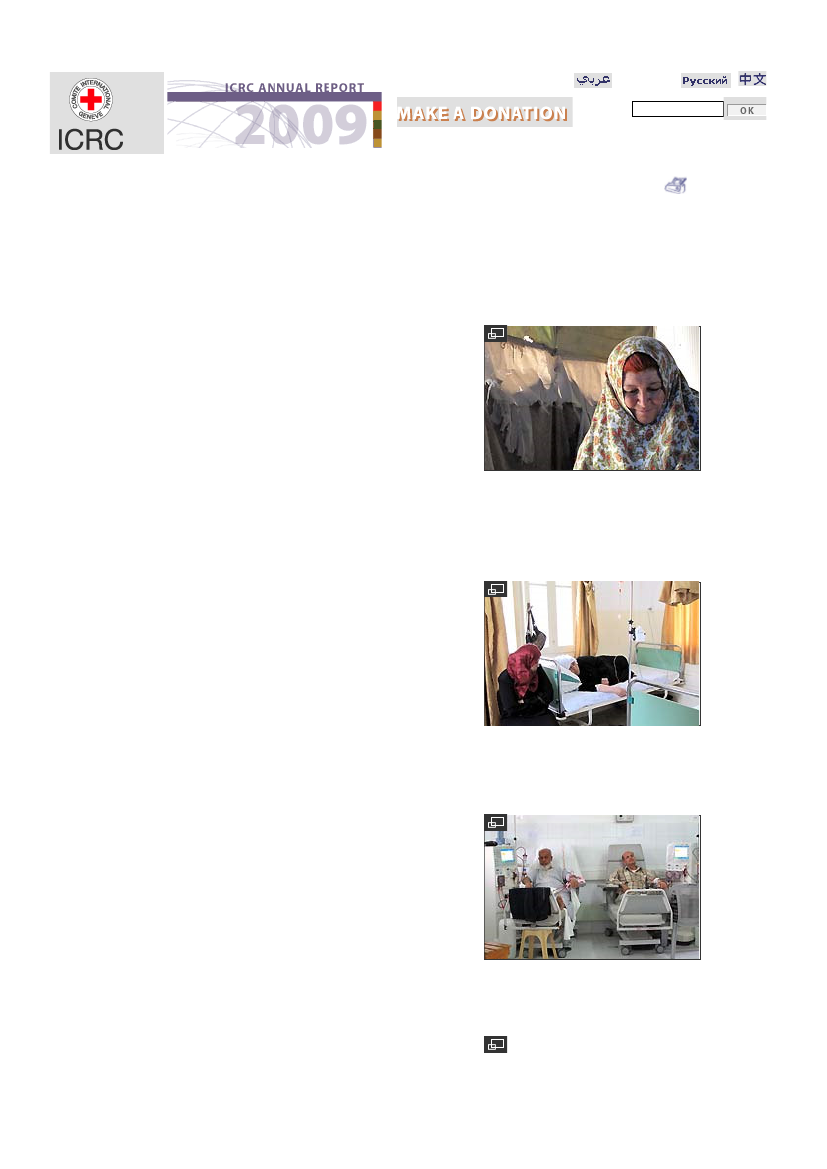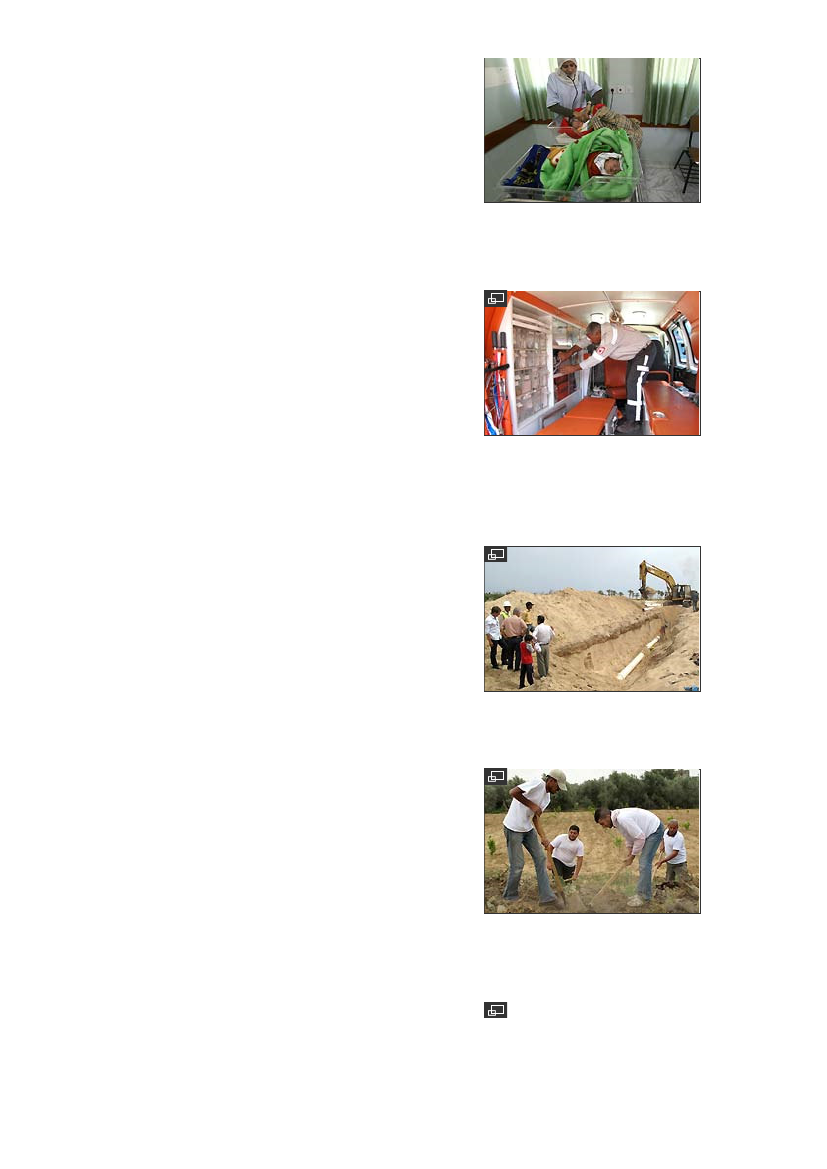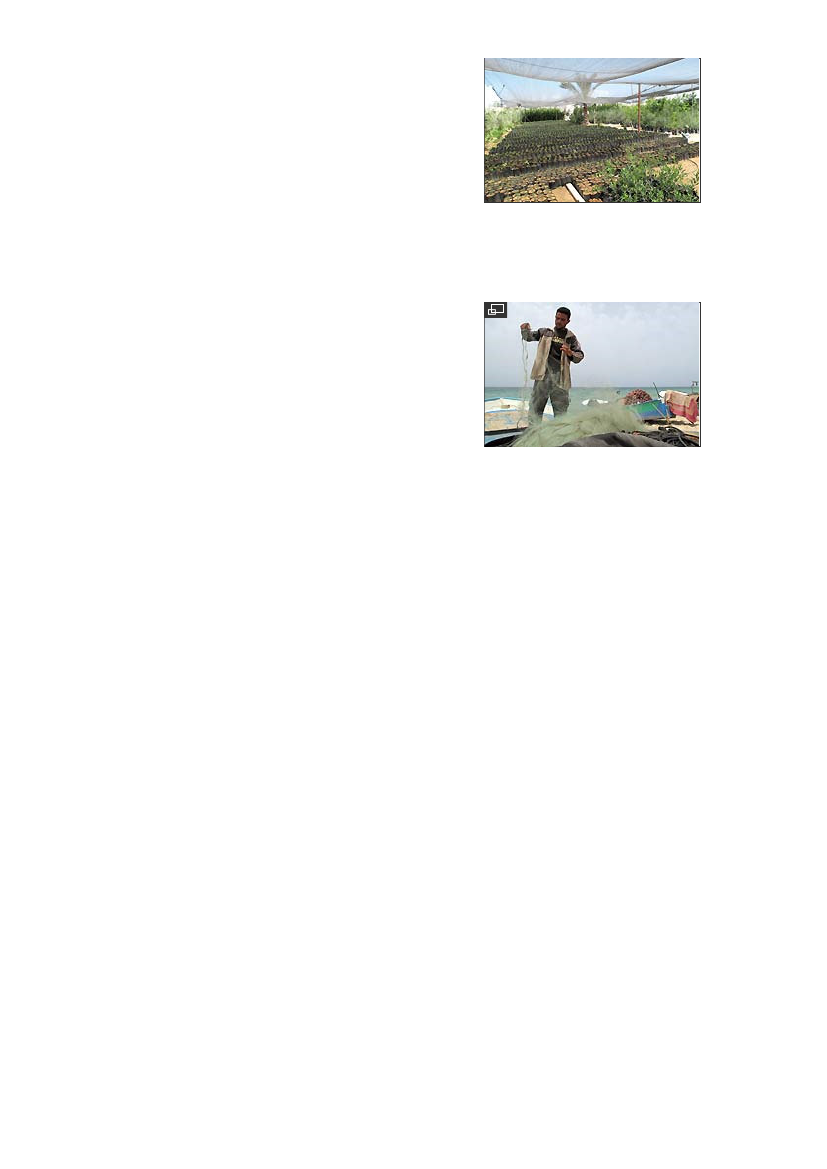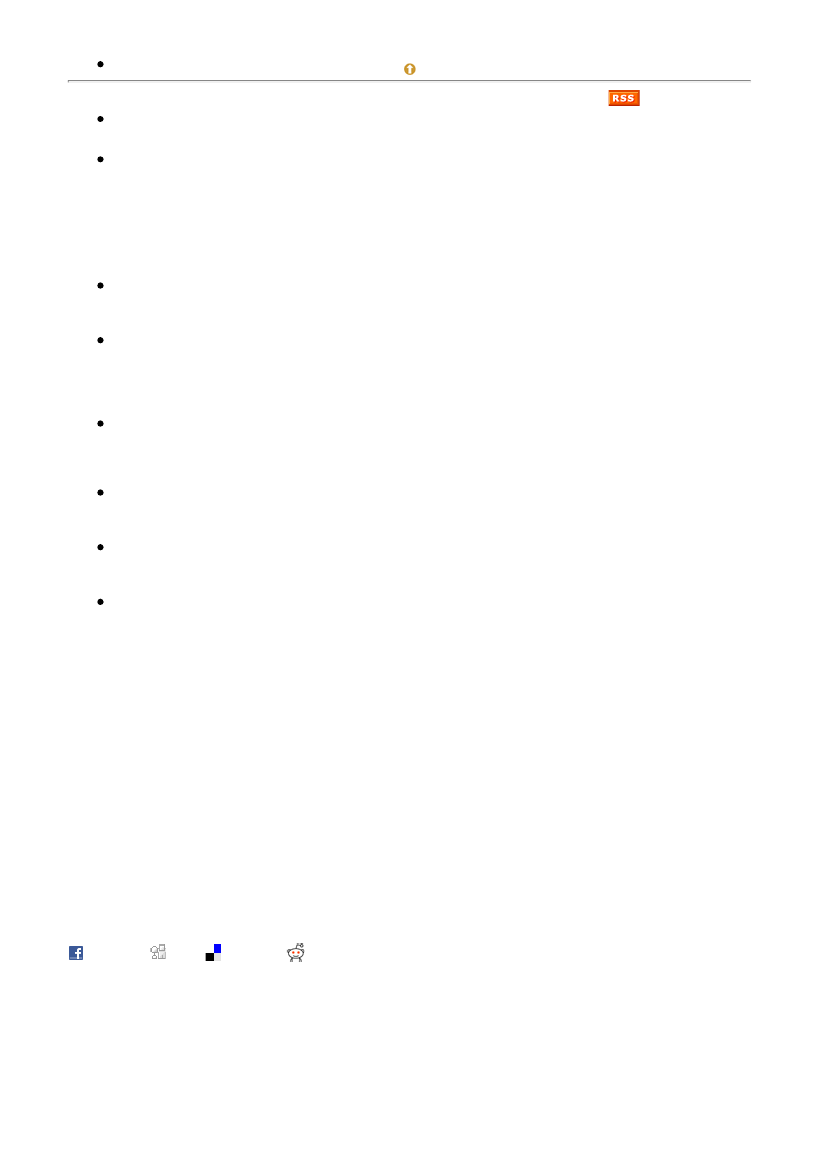Udenrigsudvalget 2009-10, Det Udenrigspolitiske Nævn 2009-10
URU Alm.del Bilag 221, UPN Alm.del Bilag 117
Offentligt
Gaza closure: not another year!
http://www.icrc.org/web/eng/siteeng0.nsf/htmlall/palestine-update-140610
About the ICRC
|ICRC activities|The ICRC worldwide|Focus|Humanitarian law|Info resources|NewsFran§ais EspañolPortuguês
SearchAdvanced SearchWhat's newHome > NewsPrint this page
|Contacts|Site map|Index
14-06-2010News release 10/103
Gaza closure: not another year!Geneva/Jerusalem (ICRC) - The hardship faced by Gaza's 1.5 million people cannot be addressed by providinghumanitarian aid. The only sustainable solution is to lift the closure.
The serious incidents that took place on 31 May between Israeliforces and activists on a flotilla heading for Gaza once again putthe spotlight on the acute hardship faced by the population inthe Gaza Strip.As the ICRC has stressed repeatedly, the dire situation in Gazacannot be resolved by providing humanitarian aid. The closureimposed on the Gaza Strip is about to enter its fourth year,choking off any real possibility of economic development.Gazans continue to suffer from unemployment, poverty andwarfare, while the quality of Gaza's health care system hasreached an all-time low.The whole of Gaza's civilian population is being punished foracts for which they bear no responsibility. The closure thereforeconstitutes a collective punishment imposed in clear violation ofIsrael's obligations under international humanitarian law."The closure is having a devastating impact on the 1.5 millionpeople living in Gaza", said Béatrice Mégevand-Roggo, theICRC's head of operations for the Middle East. "That is why weare urging Israel to put an end to this closure and call upon allthose who have an influence on the situation, including Hamas,to do their utmost to help Gaza's civilian population. Israel'sright to deal with its legitimate security concerns must bebalanced against the Palestinians' right to live normal, dignifiedlives."The international community has to do its part to ensure thatrepeated appeals by States and international organizations tolift the closure are finally heeded.Under international humanitarian law, Israel must ensure thatthe basic needs of Gazans, including adequate health care, aremet. The Palestinian authorities, for their part, must doeverything within their power to provide proper health care,supply electricity and maintain infrastructure for Gaza's people.Furthermore, all States have an obligation to allow andfacilitate rapid and unimpeded passage of all reliefconsignments, equipment and personnel.Israeli soldier Gilad Shalit is about to enter his fifth year incaptivity. Hamas has continued to rebuff the ICRC's requests tolet it visit Gilad Shalit. In violation of international humanitarianlaw, it has also refused to allow him to get in touch with hisfamily. The ICRC again urges those detaining Gilad Shalit togrant him the regular contact with his family to which he isentitled. It also reiterates that those detaining him have anobligation to ensure that he is well treated and that his livingconditions are humane and dignified.Ruined livelihoodsAlthough about 80 types of goods are now allowed into Gaza –In recent years, the quality of heath care providedin Gaza has declined with a lack of medicines,drugs and equipment.�ICRC/C. Goin/il-e-01977
The imposed closure of Gaza is entering its fourthyear, choking off any possibility of economicdevelopment and condemning the population tounemployment, poverty and a deteriorating healthcare system.�ICRC/il-e-01975
The dialysis unit at Al-Shifa hospital. Every time thepower is cut patient care is disrupted.�ICRC/C. Goin/il-e-01976
1 af 5
14-06-2010 23:40
Gaza closure: not another year!
http://www.icrc.org/web/eng/siteeng0.nsf/htmlall/palestine-update-140610
twice as many as a year ago –over 4,000 items could bebrought in prior to the closure. Generally, the price of goodshas increased while their quality has dropped – this is oneconsequence of the largely unregulated trade conductedthrough the tunnels that have been dug under the Gaza-Egyptborder to circumvent the closure.Fertile farmland located close to the border fence has beenturned into a wasteland by ongoing hostilities, affecting people'slivelihoods in many rural communities. The buffer zone imposedby Israel extends in practice over one kilometre into the GazaStrip, covering a total area of about 50 square kilometres thatis host to nearly a third of Gaza's farmland and a large share ofits livestock. Agricultural activities in the area are hampered bysecurity conditions. Israel's enforcement of the buffer zone andfrequent hostilities have resulted not only in civilian casualtiesand the destruction of civilian property but also in theimpoverishment and displacement of numerous families.Gaza's fishermen have been greatly affected by successivereductions imposed by Israel on the size of the fishing groundsthey are allowed to exploit. The latest restriction to threenautical miles has cut down both the quantity and quality of thecatch. As a result, nearly 90% of Gaza's 4000 fishermen arenow considered either poor (with a monthly income of between100 and 190 US dollars) or very poor (earning less than 100dollars a month), up from 50% in 2008. In their struggle tosurvive, the fishermen have little choice but to sail into no-gozones, at the risk of being shot by the Israeli navy."I have already been arrested and my boat has beenconfiscated several times," said Nezar Ayyash, who headsGaza's fishermen's union. "But this is our life here. We knowthat fishing can cost us our lives, but we have no other choicebut to go out with our boats: we need to feed our families."No cure in sight for ailing health-care systemGaza is suffering from an acute electricity crisis. The powersupply in Gaza is interrupted for seven hours a day on average.The consequences for public services, especially the primaryhealth-care system, are devastating. Hospitals rely ongenerators to cope with the daily blackouts.The power cuts pose a serious risk to the treatment of patients– and to their very lives. It takes two to three minutes for agenerator to begin operating, and during that time electronicdevices do not function. As a result, artificial respirators mustbe reactivated manually, dialysis treatment is disrupted andsurgery is suspended as operating theatres are plunged intodarkness.To make matters worse, fuel reserves for hospital generatorskeep drying up. Three times this year, fuel shortages haveforced hospitals to cancel all elective surgery and acceptemergency cases only. Gaza's paediatric hospital had totransfer all its patients to another facility because it could nolonger function. Laundry services have repeatedly shut down.With the prospect of increased electricity consumption duringthe hot summer months when air conditioning is required, thesituation is likely to deteriorate further if hospitals do notreceive ample fuel.Fluctuations in the power supply can also damage essentialmedical equipment. Repairs are difficult owing to the closure,under which the transfer into Gaza of spare parts for medicalequipment is subject to excessive delays of up to severalmonths.The transfer of disposable electrodes, which are used tomonitor the heart rhythm of cardiac patients, has been delayedsince August 2009. Without this equipment, patient lives are atrisk, as heart problems may not be detected in time. BecauseThe ICRC is continuing to support constructionwork for the waste water treatment plant in Rafah.�ICRC/C. Goin/il-e-01980
The ICRC supports the hospital's emergencydepartment with essential basic equipment andspare parts as well as staff training.�ICRC/il-e-01978
The ICRC maintained more than 60 ambulancesbelonging to the Ministry of Health and conducted15 station visits the the Palestine Red CrescentSociety to monitor and support the activities of theEmergency Medical Services.�ICRC/C. Goin/il-e-01981
Cash-for-work projects such as this road repairproject at Khan Younis provide essential supportfor communities.�ICRC/C. Goin
2 af 5
14-06-2010 23:40
Gaza closure: not another year!
http://www.icrc.org/web/eng/siteeng0.nsf/htmlall/palestine-update-140610
of the restrictions in place, most heart monitors in Gaza will beunusable by the end of this month. The run-down state ofequipment is one of the reasons for the high numbers ofpatients seeking treatment outside the Strip.Stocks of essential medical supplies have reached an all-timelow because of a standstill in cooperation between Palestinianauthorities in Ramallah and Gaza. At the end of May 2010, 110of 470 medicines considered essential, such as chemotherapyand haemophilia drugs, were unavailable in Gaza. Whenchemotherapy is interrupted, the chances of success dropdramatically, even if another painful round of treatment isinitiated. Haemophilia patients face life-threateninghaemorrhages when compounds such as Factor VIII and IX arenot available.More than 110 of the 700 disposable items that should beavailable are also out of stock. The only way to cope is tore-use such items as ventilator tubes or colostomy bags, eventhough doing so can lead to infections that endanger patients'lives."The state of the health-care system in Gaza has never beenworse," said Eileen Daly, the ICRC's health coordinator in theterritory. "Health is being politicized: that is the main reasonthe system is failing. Unless something changes, things are onlygoing to get even worse. Thousands of patients could gowithout treatment and the long-term outlook will beincreasingly worrisome."The health-care system is further weakened by severerestrictions imposed on the movement of people into and out ofGaza. The restrictions prevent medical staff from leaving theStrip to get the training they need to update their skills, andtechnicians from entering to repair medical equipment.Lack of sanitation hazardous for health and theenvironmentThe lack of proper sanitation and certain agricultural practicesare polluting Gaza's aquifer. Only about 60% of the territory's1.4 million inhabitants are connected to a sewage collectionsystem. Raw sewage discharged into the river Wadi Gaza,which snakes through urban areas, jeopardizes the health of thecommunities living on its banks.Because the aquifer is over-exploited, drinking water in most ofGaza contains high levels of nitrate, chloride and salt. Thewater is unfit for consumption, and the risk of contracting aninfectious disease is high.Assembling enough suitable materials to carry out sanitationprojects is a slow and haphazard process. Materials obtainedthrough the tunnel trade can be of questionable quality, whilesome items, such as certain electro-mechanical pumps, cannotbe found at all, which hobbles construction efforts."The current situation is critical and may lead to an irreversibletrend in the degradation of underground fresh water," saidJavier Cordoba, who oversees the ICRC's water and sanitationactivities in Gaza. "Large-scale projects, such as theconstruction of a desalination plant, must be undertaken tomeet water-supply needs without further exposing the aquifer.The closure must be lifted so that the 4.5 billion US dollarspledged by donor countries over a year ago can be put to use."
This cash-for-work project helps farmers boostcrop yields by enhancing soil fertility andsupporting nurseries for the cultivation ofseedlings.�ICRC/C. Goin/il-e-01982
Gaza's fishermen have been greatly affected bythe successive squeezes imposed by Israel onfishing grounds. The latest restriction to threenautical miles has cut down both the quantity andquality of the catch.�ICRC/C. Goin/il-e-01979
***ICRC activities in 2010
3 af 5
14-06-2010 23:40
Gaza closure: not another year!
http://www.icrc.org/web/eng/siteeng0.nsf/htmlall/palestine-update-140610
In Gaza, the ICRC continues to work closely with the PalestineRed Crescent Society, supporting its efforts to boost itscapacities as a provider of core humanitarian services withinthe Gaza Strip, which include pre-hospital emergency care andpsycho-social activities. The ICRC has also provided support forconstruction and renovation work carried out on three stationsof the Palestine Red Crescent emergency medical services, twoof which were damaged during last year's war.The ICRC closely monitors the situation of civilians adverselyaffected by the conduct of hostilities or armed violence. Itmakes confidential representations to the authorities or armedgroups concerned, reminding them of their obligation to complywith international humanitarian law and other internationalrules.The ICRC endeavours to ensure that a certain level of care ismaintained for sick and injured patients, but owing torestrictions there is only so much it can do. It delivers spareparts needed to keep medical equipment in working condition.In addition, to help hospitals cope with the most urgent needs,it regularly supplies medical facilities with drugs and othermedical items intended mainly for emergency rooms andoperating theatres. It also provides technical assistance andsupplies for the Artificial Limb and Polio Centre in Gaza City,where over 1,000 patients have received treatment this year.The ICRC is doing everything it can to enhance the power andwater supply in hospitals, where it is also seeking to improvesanitation, laundry and other services. In addition, it is buildingan extension to the Polio Centre in Gaza City.The ICRC continues to work on upgrades for the Rafahwastewater treatment plant which will eventually serve some170,000 people. However, to finish the work, certain materialsmust be allowed in through the crossing points. The upgrades,once completed, will result not only in a safer and morehealthful environment for the population, but also in treatedwastewater clean enough to seep into and refresh the aquifer,which remains the sole source of drinking water in the GazaStrip.The ICRC helps needy families in Gaza to make ends meetthrough cash-for-work programmes, and helps farmers toincrease crop yields. In particular, the aid it provides enablesfarmers to reclaim and develop land degraded by militaryoperations or enforced neglect, to improve soil fertility andproductivity, and to obtain enough seedlings for eachagricultural season.Over 800 Gazan detainees in Israeli prisons have beenprevented from meeting face-to-face with their loved onessince June 2007, when Israel suspended the ICRC's family visitprogramme. To mitigate the effects of this measure, the ICRChas doubled its own visits to Gazan detainees and stepped up itsefforts to maintain family links by delivering written and oralmessages between detainees and their families.
Between January and May 2010, the ICRC:visited about 450 people held in places of detentionthroughout the Gaza Strip in order to monitor theconditions of detention, the treatment they receive andthe application of procedural safeguards. Theorganization shared its findings with the authorities on aregular basis and made confidential representationswhenever appropriate;visited 300 Gazan detainees in over 20 places ofdetention in Israel;
4 af 5
14-06-2010 23:40
Gaza closure: not another year!
http://www.icrc.org/web/eng/siteeng0.nsf/htmlall/palestine-update-140610
delivered over 100 messages from Gazan families todetained relatives and over 200 from Gazan detainees totheir families in Gaza;map|Search|What's new|Contacts|Copyright|Privacy policy|Home|Site� 2010 International Committee of the Red Crossprovided about 90 tonnes of drugs
and disposable items
14-06-2010
for eight government hospitals;responded to 17 requests from the Ministry of Health tohelp keep specialized medical equipment up and running;in particular, the ICRC provided spare parts forultrasound and mammography machines, oxygenconnectors for an intensive care unit, a laryngoscopelens, and a power supply box for a CT scanner. It alsoprovided spare parts for hospital generators and washingmachines;provided technical support for Shifa Hospital's emergencydepartment, which included two emergency-roomtraining courses attended by over 50 doctors and nurses;provided maintenance for over 60 ambulances from theMinistry of Health's fleet, and carried out 15 station visitstogether with the Palestine Red Crescent Society tomonitor and support the activities of the emergencymedical services;supported the efforts of the Palestine Red Crescent toboost its capacities, and took steps to enhancecoordination between various ambulance serviceproviders in the Gaza Strip;provided support for construction and renovation workcarried out on three stations of the emergency medicalservices;provided support for Palestine Red Crescent workshopson disaster planning attended by 120 staff andvolunteers;promoted international humanitarian law in sessions withGaza's Hamas authorities, armed groups, academics andreligious groups.
For further information, please contact:Dorothea Krimitsas (English/French), ICRC Geneva, tel:+41 22 730 25 90 or +41 79 251 93 18Florian Westphal (English/German), ICRC Geneva, tel:+41 22 730 22 82 or +41 79 217 32 80Cecilia Goin (English/Spanish), ICRC Jerusalem, tel:+972 52 601 91 50Nadia Dibsy (Arabic), ICRC Jerusalem, tel: +972 2 58288 45 or +972 52 601 91 48Hicham Hassan (Arabic), regional spokesperson in Cairo,tel: +20 1 87 42 43 44Simon Schorno (English/French), ICRC Washington, tel:+1 202 361 15 66
Share this on:FacebookWhat are these?
Digg
Del.icio.us
reddit
Other documents in this section:News
In other sections:The ICRC worldwide\Middle East and North AfricaThe ICRC worldwide\Middle East and North Africa\IsraelThe ICRC worldwide\Middle East and North Africa\Palestine
5 af 5
14-06-2010 23:40





